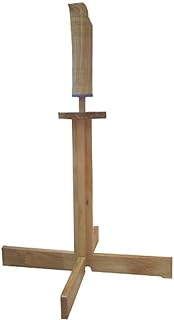When choosing a training dummy for sword practice, there are many important factors to think about. It’s not just about looks – things like durability, weight distribution, and material quality are crucial too. Balance and sturdiness are key for a good training session, so it’s important to look closely at what makes a training dummy useful and practical. By paying attention to all these factors, you can improve your skills effectively and have a more fulfilling training experience.
See our guide to the best training dummy for sword.
Material
When choosing material for a training dummy used for sword practice, durability and authenticity are key factors to keep in mind. Using wood as the main material for a sword training dummy adds realism to the training experience. Wood accurately replicates the weight and feel of a real sword and ensures that the dummy can handle intense practice sessions without easily wearing out. The natural texture of wood also enhances the tactile aspect of sword training, helping practitioners feel connected to the ancient art they are learning.
On the other hand, synthetic materials lack the natural essence of wood, often feeling fake and taking away from the immersive experience of sword training. While synthetic dummies may be more convenient and require less maintenance, they do not provide the authentic feel of handling a real sword. The choice of material for a training dummy impacts the practitioner’s connection to sword fighting, affecting their experience and progress in the discipline. By investing in a wooden training dummy, practitioners not only benefit practically but also enrich their spiritual and historical connection to sword practice, taking their training to a deeper and more meaningful level.
Size and Weight
When buying a training dummy for sword practice, it is important to consider its size and weight. Choosing a dummy that is similar in size and weight to a real opponent can improve the quality of your training. If the dummy is too light or small, it may not provide enough resistance for realistic practice. On the other hand, a dummy that is too heavy or large can cause fatigue and hinder proper technique.
Finding the right balance in size and weight ensures that your training is challenging and beneficial. The size and weight of the dummy can also affect your muscle memory and coordination during practice. Using a dummy that mimics the weight distribution of a real opponent helps develop proper technique and strength. A properly sized and weighted dummy can also improve your footwork, balance, and precision in sword techniques.
By choosing a training dummy that meets these criteria, you can have more effective training sessions that will help you in real combat situations.
Durability
When buying a training dummy for sword practice, it’s important to choose one that is durable. A durable training dummy will last longer and help you have better practice sessions. It will also make your training experience better by giving you a reliable target to aim for. While a durable training dummy may cost more upfront, the benefits it provides are worth it.
A high-quality training dummy made from strong materials like reinforced canvas or tough synthetic leather can handle daily practice and help you improve your sword skills. It can withstand many strikes and thrusts without losing its shape, giving you a consistent experience each time you practice. By prioritizing durability, you protect your investment and improve the effectiveness of your training routine. A durable training dummy is not just a tool, but a key part of mastering swordsmanship and making your skills better.
Flexibility
When looking to buy a training dummy for sword practice, it’s important to consider how flexible it is. A good training dummy should be able to move in different ways to make the practice more realistic. By being able to adjust the dummy’s position and height, practitioners can work on a variety of techniques and scenarios, which can help them get better at using a sword in real combat situations.
Not only is a flexible training dummy good for beginners, but it also benefits experienced swordsmen who want to improve their skills. Being able to adapt the dummy to different settings allows users to keep challenging themselves and avoid getting stuck in their training. By choosing a flexible training dummy, practitioners can keep growing and getting better at sword fighting.
In a world where being able to adapt is important for mastering any skill, choosing a flexible training dummy is a smart decision that can help practitioners continue to improve their swordsmanship.
Price
When buying a training dummy for sword practice, don’t just focus on the price. It may be tempting to choose the cheapest one, but you should also think about how well-made and durable it is. Investing more in a good quality training dummy upfront can save you money in the long run because it will last longer and provide better training. Cheaper dummies may not be sturdy enough for intense practice and may need to be replaced often, leading to poor training results.
In addition, a higher-priced training dummy is usually made from better materials that can give you a more realistic practice experience. This can help improve your technique and skills more effectively. Remember, it’s important to prioritize quality over cost when choosing a training dummy because it can make a big difference in the value you get from your investment in the long term.
Conclusion
In conclusion, using a training dummy for sword practice is a great way for martial artists to improve their skills. Training dummies provide a safe and consistent target for practice, which helps improve technique and precision. They also help develop muscle memory and overall performance. The durability and practicality of training dummies make them a reliable tool for improving swordplay abilities, making them essential for both beginners and experienced swordsmen.
